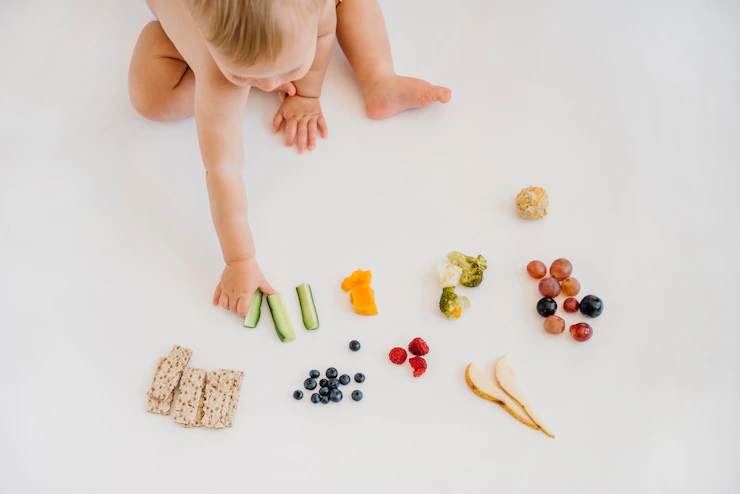
Babies with tiny tummies don’t tend to each much, so their diet must be full of nutrients. A baby’s diet needs superfood which is appropriate, nourishing and pack a big nutritional punch.
When it comes to superfoods, there are the ones that offer maximum nutritional benefits with minimal calories. Also, they are packed with vitamins and rich in minerals and antioxidants.
Certain items are suitable for babies six months and older when your infant has developed specific eating skills. Certain items such as meat, fruit and vegetable purees may be gradually introduced when your little one is ready for them. Remember that sold foods of any type should not be introduced before four months of age. If you aren’t sure, ask your paediatrician if you are unsure when to introduce certain foods that are best for your baby.
From the age of one, solid food will replace the central part of your baby’s diet, i.e. milk. Try introducing various appealing foods and encourage the baby to feed himself.
Best foods for your infants
We have listed some items which provide your little one with the essential vitamins, nutrients and minerals. You can incorporate them into the diet of your little for optimal health benefits.
-Avocados
They have the highest protein content compared to any other fruit and are rich in monounsaturated fat (the suitable type of fat), preventing heart disease. Make sure you only serve your baby with ripe avocados. Wash them from the outside and then remove the peel to mash them well.
-Bananas
They are full of carbohydrates and provide sustainable energy and fibre to support a healthy digestive tract. They can be considered a perfect portable baby food as they are easy to peel. While serving bananas to young ones, ensure they are ripe enough and thoroughly mashed.
-Sweet potatoes
Sweet potatoes provide vitamin C, fibre, potassium, and beta-carotene, an antioxidant that prevents certain types of cancer and deals with free radicals. Most babies may prefer sweet potatoes over other vegetables as they naturally sweeting taste. While being cooked and mashed, sweet potatoes make up a smooth puree that’s easy to eat, even for babies who are just starting to eat solid foods.
-Eggs
They provide protein, while the yolks contain vitamins A, D, E, B12 and zinc. The yolk also has choline, which is vital for brain development. However, doctors advise that egg whites not be served until the first year due to potential allergic reactions.
-Carrots
Carrots are known to have large amounts of beta carotene, an antioxidant, thus providing them with orange colour. Beta-carotene converts itself into Vitamin A and plays a role in the growth of a healthy vision. Cooking carrots bring a natural sweetness that makes them appealing to infants. While making carrots for your little one, ensure they are cooked until they are very soft. Then you can serve them well-cooked or in puree form.
-Yogurt
It provides them with protein, calcium and phosphorus essential for the bones and the teeth. It also has probiotics, suitable bacteria, that edit digestion and supports the immune system. Babies also need fat in their diet, so that you can choose milk yoghurt over the fat-free varieties. It’s best to avoid flavoured yoghurts, which are high in sugar content.
-Cereals
Iron-fortified creases give your baby the iron they require for proper growth and development. Babies are born with an iron supply, which starts running out after five to six months. If your baby has just begun to eat solids, doctors recommend iron-fortified rice cereals as their first foods since they are less likely to cause an allergic reaction than other grains.
-Cheese
It contains protein and calcium and is high on the dose of riboflavin, which helps convert protein, fat and carbs into energy. The Swiss cheeses, in particular, have a slightly sweet taste which appeals to babies. Take the cheese and cut it into small, diced pieces to avoid any choking hazards.
-Chicken
The chicken is packed with protein and vitamin B6, which is used to extract energy from food. Babies must regularly start eating food which contains adequate amounts of protein to support their rapid growth. If your baby doesn’t like the chicken taste, you can mix it with their favourite vegetable.
-Broccoli
It is known to be a superfood for babies. All thanks to high amounts of vitamin C, folic acid, beta-carotene, iron, fibre and potassium. Boiling broccoli in water cuts its vitamin c content in half, so it’s best to steam it. If your baby isn’t keen on tasting broccoli, mix it with a sweet-tasting vegetable such as butternut squash.
-Brown rice
It also provides energy, B vitamins, some proteins and minerals. It’s much more nutritious than white rice since most essential minerals and vitamins are processed during processing. The starch in rice is absorbed slowly, thereby providing a slow release of glucose for sustained energy.
-Butternut squash
Babies may love the taste of butternut squash. It also boasts healthy doses of antioxidants, beta-carotene, vitamin C, potassium, fibre, B vitamins, folate, and some omega-3 fatty acids. You can steam or boil the squash until tender, then make a puree until smooth.
-Tomatoes
They are an excellent source of lycopene, an antioxidant now to prevent cancer and heart disease. However, cook them with oil to improve their absorption capacity.
-Peas
Peas contain Vitamin K, a nutrient that works alongside calcium to build healthy bones. They also have antioxidants such as Vitamins A, C, and B, folic acid and fibre.
